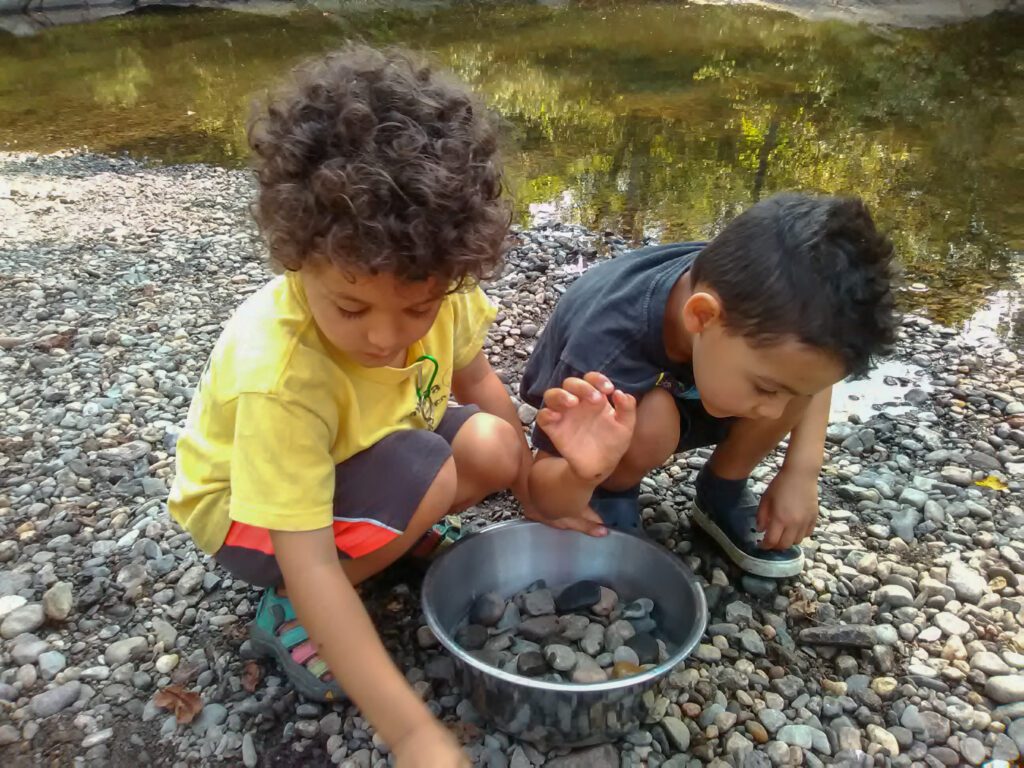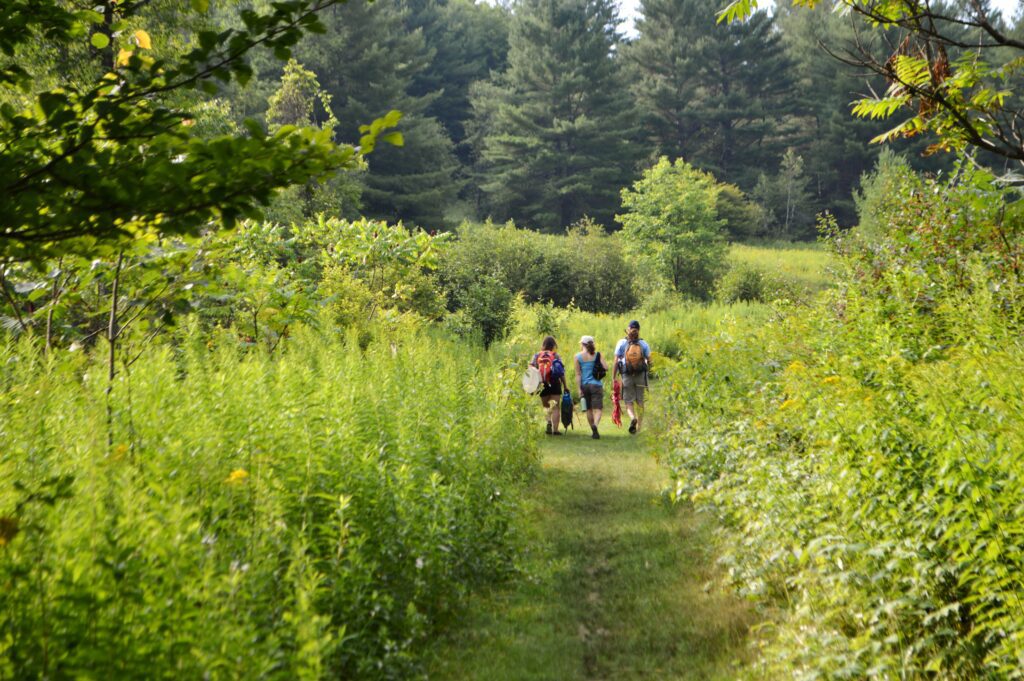WEC’s Community Fund supports a gazillion years of Naturalist Journeys at North Branch Nature Center in Montpelier
For as long as anyone at North Branch Nature Center can remember, Washington Electric Co-op has sponsored the popular Naturalist Journeys program through regular donations from the member-supported Community Fund. “Thank you for the gazillion years of support. I think that’s the accurate number,” smiled executive director Naomi Heindel.
On a summer Friday, ten days after historic flooding inundated the Nature Center’s trails and community garden and wiped out a farm road, Heindel was also appreciative of an opportunity for unexpected extra support. The Co-op’s Community Fund committee had just decided to offer $1,000 grants to nonprofits impacted by the flood. Heindel had just applied.
Even with the infrastructure damage, she observed, in some ways it was a good thing that North Branch Nature Center was saturated. “We see one of our primary roles as stewarding our 28 acres. That is top of mind for me right now because we are on a floodplain,” she explained, situated on the North Branch of the Winooski River just above downtown Montpelier. “Our fields and forests really did their part in soaking up the floodwaters headed to Montpelier and beyond. They’re still soaked, as they should be.”
The area North Branch Nature Center covers is small, but important, she said. Replanting riparian areas, tackling invasive species, and building climate resilience is all part of the plan. And with trails that connect to Hubbard Park on one side and North Branch River Park on the other, offering both education and respite to the people that enjoy the Nature Center is also part of the plan. “We see ourselves as an important link in outdoor recreation in Montpelier and in maintaining that green space for plants, animals, floodwaters, and people alike,” Heindel said.
Connecting people and nature
The mission of North Branch Nature Center is connecting people with the natural world. Heindel is proud that they offer a wide variety of ways for people to find their point of connection. “If you don’t plan your programs intentionally, you can look back and realize all your programs required being outdoors, needing to walk, listening to an expert, and were one day long,” she said. That model doesn’t take into account the diversity of abilities, interests, and schedules of their audience. In addition to diverse options, she added, “it’s important to not associate any type of value judgment to any program. There’s just as much value in someone connecting through an immersive weekend program on sedges or moss as there is in someone who comes on a paddle, or for a nature romp, or campfire, or nature journaling workshop. We want to make sure we offer all those entry points.”

North Branch Nature Center is now focused on actively reaching communities that have been historically excluded from participating in nature education. These are the same communities, Heindel pointed out, that are impacted most by the climate crisis and socioeconomic injustice. Members of Central Valley Family and Friends United (CVFUN), a social organization for adult members of the developmental disabilities community, enjoy regular outings to the Nature Center. Staff naturalists join members of the Northeast Disabled Athletics Association to bring nature education to inclusive kayaking excursions in the Champlain Islands. The Nature Center dedicates a certain number of summer and spring break camp spots to families served by the Central Vermont Refugee Action Network, and will host the network’s annual picnic.
Other new partnerships include organizations celebrating and supporting body positivity and queer identities, including Rainbow Bridge Community Center in Barre, the Vermont chapter of the Body Liberation Outdoor Club, and Outright Vermont. These new partnerships have opened up joyful connections – Heindel, who served as the naturalist on an inclusive kayaking trip, said it was a fantastic experience – and, she added, she’s seen visitors who first come with a new partner organization return for other Nature Center programs.
History of land use
“When you learn to appreciate and connect to any place, it then teaches you to appreciate and connect with all places,” said Heindel, describing the importance of the place-based nature education practiced at North Branch Nature Center. This past year, a special Naturalist Journeys program dived into the history of the Nature Center land itself.
Naturalist Journeys – the program supported by Washington Electric Co-op members through their donations to the Community Fund – is one of the Nature Center’s oldest and most beloved programs. Natural scientists share the stories of wildlife they’ve encountered in travels, or discuss their environmental research. “It’s a chance to dive in deep to a place and understand its interconnections,” explained Heindel, and the program is generally offered in winter and early spring, when Vermonters tend to feel particularly cooped up. The program pivoted to a virtual model during the early years of the COVID pandemic, and is now offered in a hybrid in-person/virtual format.
Landscape historian Samantha Ford researched the land use of the Nature Center’s footprint over the last 230 years or so and brought it to life in a Naturalist Journeys presentation on March 15, 2023. Ford, of Turn Stone Research, focuses on colonial and postcolonial land use history. The land was cleared by settlers moving north from Massachusetts in the 1790s, Ford discovered, and farmed for hundreds of years. Morgan horses were once bred on the property. In the late 1800s, a woman owned and farmed the land; a rarity. “[Ford]’s absolutely masterful at digging up history, looking up old deeds, newspaper records, archival info, interpreting that, and then turning it into a story. She was able to present to us about people being born, living here, dying here, the size of the farm,” said Heindel. “It deepens our appreciation of the space and to keep it open. This land has been a working landscape for hundreds of years. As we’re stewarding it, we can think of all the people that came before us.” The Nature Center plans to install interpretive panels on the property featuring these newly uncovered stories.
One solution
Even while trails were still underwater, North Branch Nature Center staff were still looking forward to their to-do lists. “We are just putting finishing touches on a new universal access trail,” said Heindel, and are developing signs for a new nature connection interpretive trail. “Once it dries out, I would love to have folks who haven’t been here, or who have but it’s been a long time, swing by, say hi, go for a walk, sit on a bench and look at the birds. There are going to be new, accessible and exciting things here,” she promised.
That’s not just optimism, but finding pragmatic solutions in climate instability. New accessible or instructive nature trails are just as strategic as planting native species in a riparian zone upstream of a catastrophically flooded capital. “Nature connection is really important for mental health and social well being,” explained Heindel. “A kid who comes to one of our programs for even one afternoon a week is spending that afternoon without screens and the pressure that comes with them. We are the antidote to that.”

When climate change events and biodiversity loss coincides with social, racial, and economic injustice and inequality, Heindel suggested, we need places that support healthy communities and landscapes. “It’s not the only solution, but it’s our answer,” she said. “This nature center, and truly all the nature centers out there, are a really important piece of the puzzle of how we take care of the planet and how we take care of ourselves and our communities.”
| For more information about North Branch Nature Center, visit NorthBranchNatureCenter.org. WEC members may donate their capital credit refunds or make direct contributions to support the Community Fund. Contact Rosie Casciero at 802-224-2322 for information. |
| Community Fund Pivots to Offer Flood Cleanup Grants |
|---|
| After the catastrophic flooding of July 10, the committee that oversees WEC’s Community Fund quickly decided to dedicate funding to flood relief. The Community Fund informed grantees and other not-for-profits in WEC’s service area that rapid relief grants of up to $1,000 were available for organizations impacted by flooding. Grant funds are still available to eligible organizations. WEC’s Community Fund is funded entirely by voluntary contributions from members. To learn how to apply for a grant, or for how you can contribute to the Community Fund, contact Rosie Casciero: rosie.casciero@wec.coop. |
About WEC’s Community Fund
WEC’s Community Fund is made up entirely of member contributions. More than 1,400 members choose to donate their capital credits to the Community Fund; others make donations out of pocket. This generosity allows WEC’s fund to make grants to small nonprofits in the Co-op’s service area. To learn how to donate your capital credits, or to make a contribution to WEC’s Community Fund, 802-224-2322.
WEC Community Fund Grant Recipients
AWARE
Barre Opera House
Barre Partnership – Barre Heritage Festival
Boy Scouts of America Green Mountain Council
Bradford Public Library
Brookfield Community Partnership
Cabot Arts and Music Festival
Cabot Community Association
Cabot Mentoring / Cabot Ride the Ridges
Center for an Agricultural Economy
Central Vermont Adult Basic Education
Central Vermont Career Center
Central Vermont Home Health & Hospice
Central Vermont Humane Society
Chelsea Arts Collective
Chelsea Public Library
Cross Vermont Trail Association
Family Center of Washington County
Friends of the Mad River
Fuel Your Neighbors – Capstone
Good Beginnings
Hardwick Area Food Pantry
Hunger Free Vermont
Just Basics, Inc.
Kellogg-Hubbard Library
Neighbors in Action
North Branch Nature Center
Northeast Kingdom Council on Aging
Peacham Library
People’s Health & Wellness Clinic
Plainfield Historical Society
Prevent Child Abuse Vermont
Recovery Partners of Vermont
Roxbury Free Library
Rural Vermont
Salvation Farms
The Help Fund
The Veterans’ Place, Inc.
Tunbridge Public Library
Twin Valley Senior Center
Upper Valley Haven
Vermont Campership Fund – Lotus Lake Camp
Vermont Center for Independent Living
Vermont Community Loan Fund
Vermont Council on Rural Development
Vermont Foodbank
Vermont Granite Museum Stone Arts School
Vermont Parks Forever
VerShare & Town of Vershire
VT Agricultural Hall of Fame – Champlain Valley Exposition
Washington County Mental Health
Woodbury Volunteer Fire Department
Worcester Arts Festival
